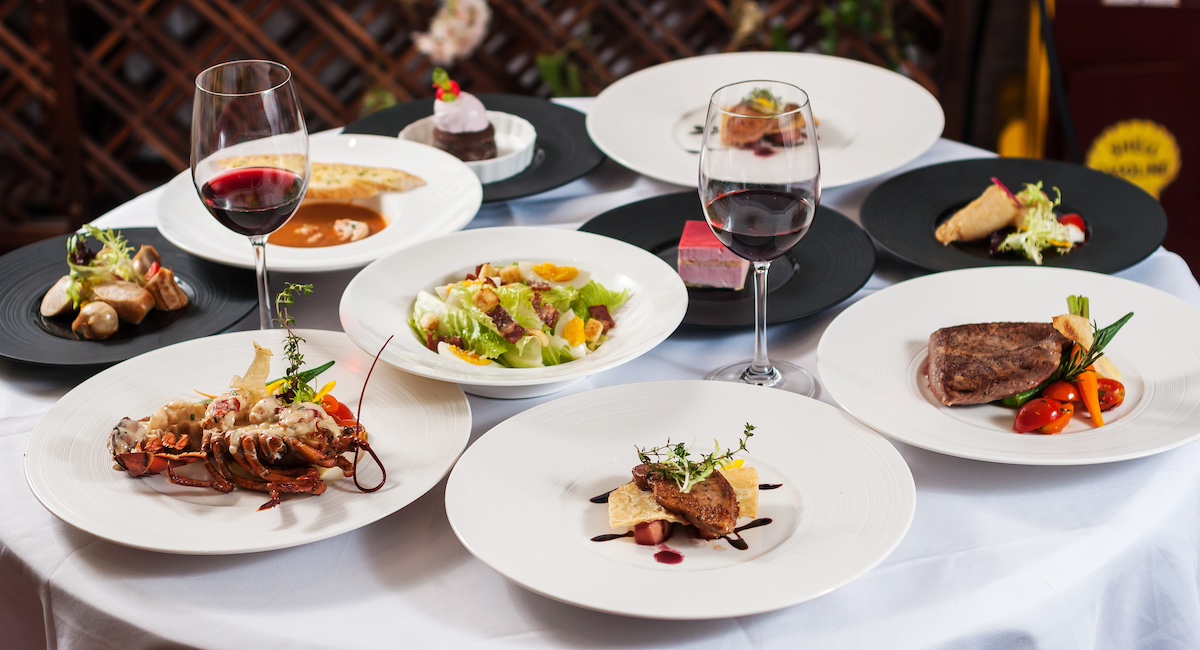When you picture France, what comes to mind? The Eiffel Tower, stately Haussmannian buildings, boulangeries full of flaky, buttery croissants…
But what about when you picture a French person? You wouldn’t be alone if the idea of a rude, chain-smoking, skinny, sexy, baguette-wielding, beret-wearing gourmand popped up, like a judgmental angel on your shoulder. Pop culture has fed us numerous French stereotypes, some of them true, but many of them false. So read on to learn which of these stereotypes hold weight, and which ones should be taken with un grain de sel.
French Stereotypes: True or False?
The French wear berets and striped shirts
Ah, the beret. Of the common stereotypes of French fashion, this is perhaps one of the least true. French people today don’t wear berets, and if you see someone wearing one in France, it’s fair for you to assume that they are a tourist who picked the hat up at a kiosk by the Notre Dame.
However, the Breton shirt, or marinière, is another story. While you won’t see this striped shirt all the time, you’ll definitely come across a French person wearing one if you hang around the country long enough. Originally worn by members of the French Navy, these old school blue and white striped shirts were popularized in the early 20th century by Coco Chanel. Celebrities in France, like Brigitte Bardot and Jean Seberg, made the striped shirt a staple of French fashion in the mid-20th century, and many French people still buy them from heritage brands like Normandy’s Saint James.

French people are dirty
There are a few odd French stereotypes that have managed to linger despite all evidence to the contrary, one being that French people don’t bathe, don’t use deodorant, and are otherwise rather pungent. The stereotype that the French stink actually dates back to World War II, when the US army liberated France. Poor plumbing, rationed soap, and other after effects of the war obviously led to a less-than-pristine population, since the many of the French literally couldn’t access soap or clean water.
But today, most French people shower daily, and don’t deserve their bad reputations for body odor and poor hygiene. (The same goes for the stereotype that French women don’t shave their legs, and while the choice to go au naturel is up to each individual’s discretion, statistics point to this not being the case.)
French people never work
There are certain stereotypes that the French are lazy or never work, that they always take three hour lunches and are constantly on strike. As with many French stereotypes, this one is a myth. But while the French are far from lazy, they do maintain a work-life balance that most Americans would find enviable. The average work week in France is 35 hours (compared to 40 in America), French workers get at least five weeks of paid vacation per year, and there are laws in place to protect French workers from predatory employers. For example, it is illegal to answer work calls or emails on the weekend, and it is also illegal to eat lunch at your desk in France.
However, despite all these worker protections, France still has the seventh largest economy in the world, proving that it’s possible for a nation to be productive without exploiting its labor force.

French people eat a lot of baguette
The baguette is part of France’s stereotypical diet for a reason. Each year, 10 billion baguettes are consumed in France, purchased from bakeries and grocery stores around the country. The average French resident eats baguette 15 times per month, or just about every other day. It is served with lunch or dinner, or eaten with chocolate as part of an afternoon goûter, and if you walk down the street, you’ll be guaranteed to see at least one French person with a baguette sticking out of their bag.
French people hate Americans
Let’s get this out of the way: the idea that all French people hate all Americans is ridiculous. The French are fascinated by America, as most of them grew up on imported American music and movies that have helped shape global culture (for better or for worse).
That being said, just as we have stereotypes about the French, they certainly have stereotypes about us: that we are loud (true), that we are overly friendly to strangers (true), that we don’t make the effort to try and speak French (not always true), and that we all own guns and voted for Trump (true for some, but definitely not all). The French certainly love to make fun of Americans, but it’s really not something you should take personally.

French people are rude
The idea that French people are rude is one of the most pervasive French stereotypes, but this misunderstanding comes from a lack of familiarity with French culture. Most of the French people that Americans interact with in France are customer service workers: servers, store clerks, hotel concierges, support staff at major tourist sites. And Americans are used to a customer service culture where the customer is always right, and customer service employees are supposed to smile and make small talk, and bow to your every whim.
This is not the way it is in France. Particularly because French servers and other workers don’t work for tips, they don’t go out of their way to be cheery or upbeat. Small talk isn’t part of their job description. And the French tend to take their time, even at work, so you may have to set aside more time when eating out, because you can’t expect a waiter to fly over to your table the second you decide you want to order. They aren’t ignoring you, and they will get to you when they can.
Many Americans respond to these perceived slights by acting out, and being rude to restaurant workers. Generally, all this behavior will do is convince your waiter to never return to your table.
The French also tend not to allow substitutions when eating out, so if you ask for a gluten free burger at a brasserie, don’t feel put out when the waiter tells you they can’t accommodate you. They aren’t being cold or dismissive, they are just following the rules of their place of work.
It’s also worth noting that not all regions of France share the same general culture when it comes to etiquette and customer service. When people picture rude French people, they often are drawing from customer service interactions that took place in Paris. As with any major city, Parisian residents tend to be busier and brusquer than those in more rural areas. In other, less-touristy parts of the country, you may find a warmer reception and more accommodating hospitality.
The French are always on strike
This French stereotype is actually somewhat true! There is a powerful protest culture in France, in large part due to their strong labor laws. The French are always willing to band together to fight for their rights, either at work or in the political sphere, so manifestations, or protests, occur frequently throughout France. This can be a pain when something like the TGV (regional railroad) is on strike, so keep abreast of any major strikes that are planned during your travel time in France.

The French are good in bed (but unfaithful lovers)
The French are often over-sexualized in American media, appearing as sexy, glamorous love interests who are better at a lot more than just kissing. It is true that the French in general are somewhat more sexually open-minded (considering that they don’t have the same Puritanical attitudes towards sex that Americans do), but by all accounts, that doesn’t necessarily make them better in bed.
It is true, however, that the French have different attitudes towards infidelity than Americans do. The French tend to be more accepting of infidelity, and don’t necessarily consider it immediate grounds for a breakup, or a reason to oust someone professionally. Famously, former French President François Hollande’s ratings went up after it was revealed that he had a mistress. But not all French men are secret Casanovas, and not all French women are duplicitous femme fatales.
The French all smoke cigarettes
When you visit France, you’re likely to see French people smoking on cafe terraces or outside bars, and standard cafe tables will have ashtrays set out. But it’s certainly not true that all of the French smoke. As of 2021, an estimated 25.3% of French people identified as daily cigarette smokers, compared to 11.5% of Americans in the same year. In France, you can’t smoke in restaurants or bars, public parks, public beaches, or near schools, and acceptance towards smoking has decreased over the years. But a quarter of the population does smoke cigarettes, and smoking is a generally accepted part of daily life.

The French eat a lot of cheese
The French do, in fact, eat a lot of cheese. France consumes more cheese each year than any other country in the world, and it’s no wonder why! There are hundreds of types of cheese in France (thousands, depending on who you ask), and they are all fantastic. Cheese is a popular component of the French diet, with 40% of the French eating cheese on a daily basis.
French are snobbish (and judgmental!)
This one is a little true. France is a country of good food, good wine, incredible art and fashion, and legal protections that offer everyday citizens the opportunity to enjoy a high quality of life. If you had all that at your fingertips, you’d probably be a little bit of a snob, too!
But it’s always important to learn local etiquette to avoid unnecessarily earning the ire of locals. Most French people aren’t monsters, but they’ll definitely scoff at you for things like talking loudly, eating in the métro, or even wearing shorts.
French love wine
France has some of the best wine in the world, so it makes sense that a lot of French people drink wine on a regular basis. You might even see a French person enjoying a glass of Chablis with lunch, or watering down a small sip of wine for their child to taste. But French wine consumption has actually dropped by 50% in the last 60 years, and these days, beer is the most popular alcoholic beverage among French people aged 18-35.

The French always surrender
File this stereotype under “all French people are cowards” as well. While it’s certainly not true that the French surrender whenever given the chance (consider the vast colonial empire France once wielded, which certainly involved not-insignificant military might to put together), this stereotype comes from one famous surrender in particular.
During World War II, the French army surrendered to the Nazis within a matter of weeks. This is not the brightest chapter in French history, and it has unfortunately left the French stuck with a stereotype for cowardice. This trope might not have found such widespread popularity if not for a 1995 episode of The Simpsons, in which the French are referred to as “cheese-eating surrender monkeys.” The phrase caught on, and was later used to mock the French for their refusal to get involved in the Iraq War.
The French Never Get Fat
In 2004, French author Mireille Guiliano published the now infamous diet book, French Women Don’t Get Fat. The book revolves around the assumption that the French can get away with eating bread and drinking wine all the time without gaining weight, and it promotes the problematic stereotype of the thin (usually white) French woman who is effortlessly chic and slim, ages gracefully, and sneers at poor, ugly American women with their Weight Watchers diets and cosmetic surgeries.
There are French women of every body type, and while fatphobia is as prevalent in France as it is in the United States, there are French people who are fat, or get fat, no matter their lifestyle habits, and they are no less French for it.

French people can’t or won’t speak English
There are two somewhat conflicting stereotypes about French people speaking English. Some people find that when they try to speak French in France, French people will automatically switch to English if they detect the slightest hint of a foreign accent. Others may have difficulty finding French people who can comfortably converse in English.
Both stereotypes have some truth to them. France actually has some of the lowest English literacy rates in Europe. According to EF, they rank 30th out of 34 countries in Europe for English literacy. The French language is highly protected in France, and is commonly spoken around the world, so there isn’t as much of an incentive for French people to learn English. However, as English remains the de facto language of business in the global economy, many of the French (especially young people) do desire to learn English. So if they try speaking English to you, it’s not an insult! Most of them want to practice their English with native speakers, so you may have to try hard to get them to talk with you in French.
The French always eat gourmet meals
Compared to the U.S., it is true to say that the French eat quite well. While not every meal is a six-course gourmet affair, elaborate homemade meals made from fresh ingredients are not necessarily reserved for special occasions. The French have a great respect for quality when it comes to food, and even French school children enjoy cafeteria lunches that would put your Ellio’s pizza to shame. But it’s a dirty little secret that as much as the French love good food, they also have quite a soft spot for fast food and American chains like McDonald’s.

France has the world’s best healthcare system
It is true that France has an amazing public healthcare system, and many Americans are shocked at how cheap and easy it is to receive medical care in France. However, France actually currently ranks as having the 20th best healthcare systemin the world. (Singapore is #1, and several East Asian and Scandinavian countries are high up on the list.)
The French love to complain
This is another French stereotype that has quite a bit of merit! French people do indeed love to complain; it’s a form of small talk to grumble about politics or tourists or the latest protest as a way of shooting the breeze. While you might call an American a Debbie Downer if they complained all the time, it is simply an accepted part of French culture.
Catherine Rickman is a writer, professional Francophile, and host of the Expat Horror Stories podcast. She is currently somewhere in Brooklyn with a fork in one hand and a pen in the other, and you can follow her adventures on Instagram @catrickman, or on TikTok @catinthekitchen.






